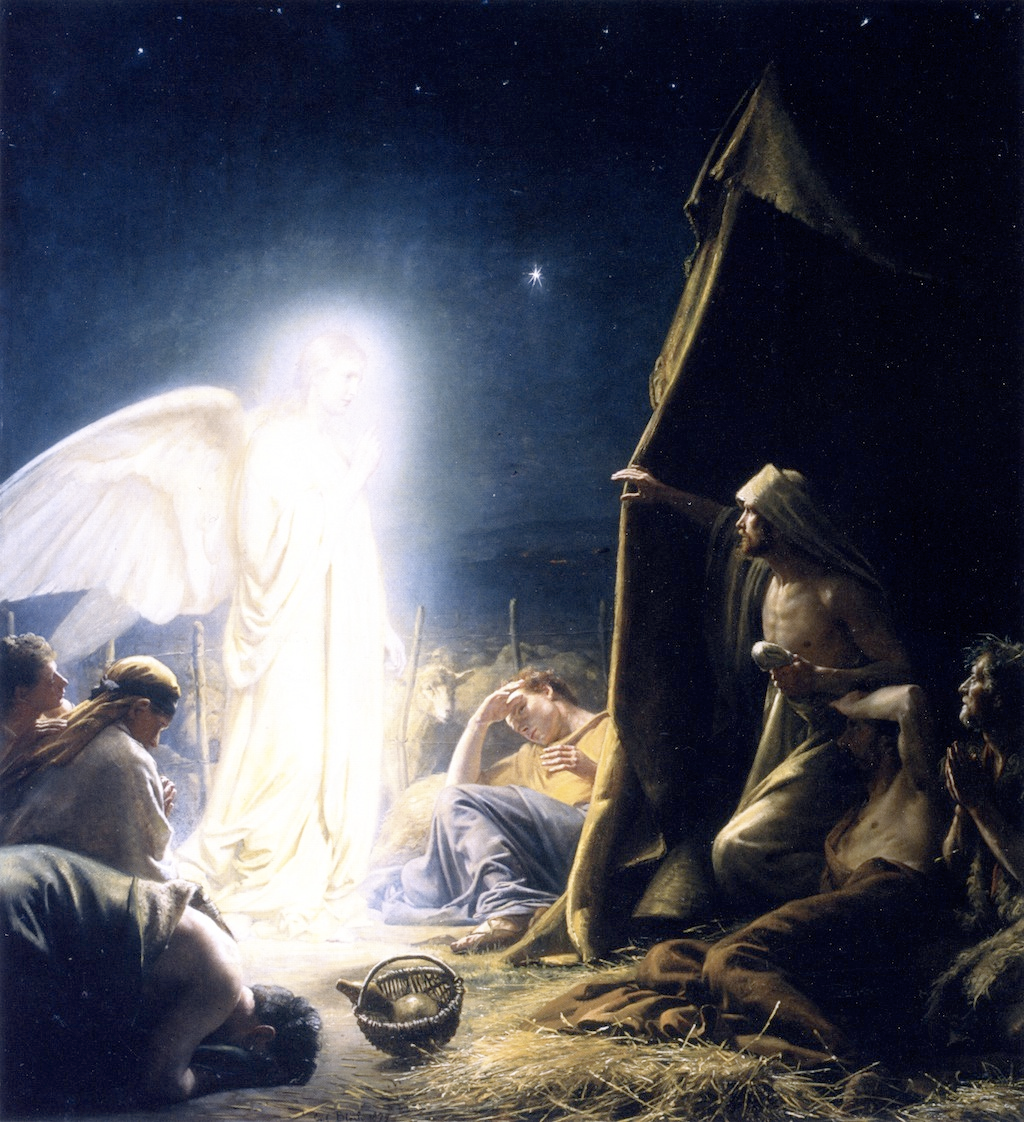Co-missioners,
It’s Christmas Eve, a day for all of us to sit quietly with Mary and ponder the marvel of her newborn son. To that end we pass along an extended meditation by Steve Albertin. It rings some cherished Lutheran chimes that, in Steve’s handling of them, turn out be more subversive than some of us may have thought or even now would want to think. Really, such fun it is to sniff our pious and high-minded disdain over the holiday habits of the hoi poloi.
Think again, says Steve. Here, of course, he parrots that mangered baby who all to soon will be saying it this way: “Repent, already. Believe the Gospel.”
Better still, enjoy the Gospel. Merry Christmas!
Peace and Joy,
The Crossings Community
The Great Gift Exchange
A Meditation on Luke 2:1-20
by Steven E. Albertin

It does not take much for me these days to become an Ebenezer Scrooge about Christmas: “Bah! Humbug!” I feel that way not because I don’t like Christmas but because I dislike what Christmas has become. The materialism and the Santa without Jesus make Christmas just another excuse for a party.
However, just when I am ready to give up on Christmas, I have second thoughts. Maybe “the holidays” are not what they appear to be. Maybe what we see around us is not Christ being driven out of Christmas but Christ’s continuing power among us and his refusal to let this world slip away from his love.
“How can that be?” you ask. “Where in this massive annual expression of self-indulgence do you see Christ?”
Our culture’s celebration of Christmas is marked with flickering candles, the singing of carols, decorated trees, outdoor lights, festive foods and holiday parties. However, it would not be Christmas without the exchanging of gifts. Exchanging gifts is at the heart of the commercialism we most detest.
What is there about exchanging gifts that is so essential to the celebration of Christmas? We have many other holidays in our national life with their accompanying traditions. There are pumpkins at Halloween. There is turkey at Thanksgiving. There are fireworks on the Fourth of July. There are bunnies at Easter. However, only for Christmas is the exchanging of gifts so central. Even in the midst of an uncertain economy, our culture is determined to make the exchange of gifts lavish and extravagant. In fact, opinion makers measure the success of the holiday by the amount of money Christmas gift-giving pumps into the economy.
So why make such a big deal out of gift-giving? Could it be that gift-giving is about more than boosting the economy? Could it be that deep down our gift-giving is a sign that our world is hungering for grace? Could it be that our gift-giving reveals an ache that throbs in our hearts? We may not want to admit it but we all know that we cannot make it through this life on our own. We all need the help, assistance and kindness of others? Could it be that Christmas gift-giving is the way that our culture recognizes this fundamental human hunger in all of us? We all want to believe that our lives matter, that someone loves us and that there is hope for the future. Could it be that the persistence of Christmas gift-giving in our culture recognizes the truth of the Biblical Christmas story? That regardless of how hard we try, we cannot be our own gods? That we are dependent on a God whose love cannot be earned but can only be received?
 However, our culture’s exchanging of gifts at Christmas is often nothing more than another way to keep score in a world that thrives on keeping score. We give gifts to those who deserve them. Those who do not deserve them we ignore.
However, our culture’s exchanging of gifts at Christmas is often nothing more than another way to keep score in a world that thrives on keeping score. We give gifts to those who deserve them. Those who do not deserve them we ignore.
However, that is not what God did at Christmas. In fact, if God only gave this world what it deserved, we would be in very big trouble.
That is what the shepherds believed when the Angel of the Lord suddenly showed up on that first Christmas night! They were frightened, scared out of their wits. If God or his Angel-in-Chief flashed into view one night in a blinding light that revealed us for all the world to see, then we too would be shaking in our shoes. Exposed by such divine scrutiny, our first reaction would be fear, because we know all too well how imperfect our lives have been and how undeserving we are of God’s favor.
However, that is not what God did on this Holy Night. The first words out of the mouth of this divine messenger proclaimed, “Do not be afraid. This is no time to shudder in your shoes. This is a time for good news. God has come not to give you shepherds what you deserve but to give you what you do not deserve. Are you not glad that God has?”
Where is the proof that such a wonder has happened? The angel tells the shepherds to go to Bethlehem. There they will find that divine assurance in the most unusual of places: in a baby lying in a manger, wrapped in strips of cloth.
Why a manger and strips of cloth? Because they signal the ultimate destiny of this child! The wooden feed trough, the manger, would one day be shaped into a wooden cross on which this child would be crucified. The strips of cloth in which the babe was wrapped would one day be the strips of cloth that would wrap his crucified body.
You see, already here, on the night of his birth, we see signals of how different this gift is from any other. This is no ordinary gift exchange. This no part of “let’s make a deal.” This is no transaction between equals. This is no balancing of the scales of justice. This is no “tit for tat,” no quid pro quo. This exchange is very one sided. This is like a mother exchanging her life for the life of her child as she runs out in the street to push her child out of the path of an on rushing truck only to lose her own life. This is a soldier exchanging his life for that of a friend by putting himself in the line of fire and taking a fatal bullet so that his friend might live. This is a father exchanging his life for that of his guilty son and going to jail for him. This babe lying in the manger will one day die for the sins of the world, exchanging his life for ours.
 Can you imagine a gift exchange like this? There is none like it in the entire world. When we exchange our gifts, we try to give our best. We try to match in quality what the giver has given to us. But not here! Here God gives us His best in exchange for our worst. He begs us to give him all those things of which we are ashamed and embarrassed. Here in the manger God takes the initiative and invites us to give him our worries, our fears, our skeletons in the closet, our sins—everything that is wrong with our lives. We would not dare think of giving them to anyone else. Things like this we want no one to see. However, God sees them and invites us to give them to Him. In this babe God offers to suffer for us the deadly fate we deserve so that we might live.
Can you imagine a gift exchange like this? There is none like it in the entire world. When we exchange our gifts, we try to give our best. We try to match in quality what the giver has given to us. But not here! Here God gives us His best in exchange for our worst. He begs us to give him all those things of which we are ashamed and embarrassed. Here in the manger God takes the initiative and invites us to give him our worries, our fears, our skeletons in the closet, our sins—everything that is wrong with our lives. We would not dare think of giving them to anyone else. Things like this we want no one to see. However, God sees them and invites us to give them to Him. In this babe God offers to suffer for us the deadly fate we deserve so that we might live.
Martin Luther calls it “the happy, the blessed, exchange.” Or as some have described it: “the sweet swap!”
There is no more wonderful gift exchange in the entire universe. It captures our hearts and imagination like no other. No wonder that famous Christmas carol, “O Little Town of Bethlehem” sings “the hopes and fears of all the years are met in thee tonight.” Trusting that promise changes our lives. Giving and generosity become a way of life.
Even though our culture may not understand why, it feels compelled to imitate this strangely wonderful “happy exchange” through its annual outpouring of Christmas generosity and gift-giving.
See, in spite of what seems to be the growing commercialization of Christmas and the secularization of the holiday, the power of the Christmas story remains. The frenzied obsession with the exchanging gifts, the compulsion to give even to those who do not deserve it: all signal that the baby in the manger has not been expelled from Christmas. They are continuing reminders that God still has not let go of this world. God has promised to not loosen His grip on this world until all have been blessed by the babe in the manger—the greatest gift exchange of all.



You must be logged in to post a comment.